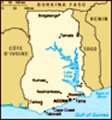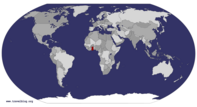Advertisement

 Making Clay Liners
Making Clay Liners
Me and Louis are working hard at helping make some clay liners for the new wood stoves at the clay manufacturers.So it’s time for me to explain a little bit about what exactly I’m doing here in Ghana. It all started last September when I ran for an executive position with Engineers without Borders at McGill. Engineers without Borders(EWB) is a Nationwide club that seeks to share knowledge and education regarding development work, particularly in regards to technology. Part of their mission is raise funds to send university students overseas each summer to work for 4 months in a developing country, usually through partnering with a local Non-Governmental Organization(NGO). The idea is to hopefully provide these students with the opportunity to have small impact on the community that they are working in but more importantly to give them first hand experiences that they can use to relate to people back in Canada who have never had the opportunity to work or travel in a developing country. I was lucky enough to be chosen as one of the students who was given the opportunity to work overseas for the summer. My placement was slightly different then other students in that I was partnered with a long term volunteer Louis Dorval, who I mentioned in my last posting. He has been in Ghana

 Hard at work
Hard at work
Here I am, trying to do what I can in helping make the catchment tray for the clay liners shown above.since February working with EnterpriseWorks(EW). He initially came to Ghana to work with EW on a small-scale irrigation technology called the treadle pump. However, due to funding problems which occurred about the time he was traveling to Ghana, the project was cancelled. I was supposed to come and join him when I finished my semester in May to help market and demonstrate this technology to small villages and communities in Northern Ghana. This was my original assignment. However, as I’ve been quickly learning in the field of development, things change rather rapidly in response to funding. That aside, there are a few other projects that I will be working on and I’ll do my best to explain my role here in Ghana.
As a civil engineering student at McGill University, coming to Ghana to work with an NGO on various development projects may not have been the best choice as far as experience in my field, but is the best choice I could have made in broadening my perspective on the way the world functions. The technical applicability of my degree is practically null and void here, except when you are lucky and find that you are building a clay extruder to make clay linings for low emission wood stoves, and being part of the erection of a wind turbine on a mango plantation. These are both situations I’ve encountered within the first two weeks of my time here in Ghana working with EnterpriseWorks (EW) in Accra.
EW is an American based NGO that works to provide simple technological solutions to meet the local demand in the hopes of fighting poverty. Their slogan is, “Fighting Poverty with Profit”. They run great marketing campaigns for these technological innovations and have introduced various items such as, a small-scale treadle pump for micro-irrigation which they named the SOKA pump and a charcoal stove called the Gyapa stove. All of EW’s technological solutions are designed with local materials to create new sources of revenue for manufacturers. The SOKA pump was designed to be used by farmers to irrigate their field during the long dry season that much of Ghana faces. During this time, many farmers have a hard time growing crops so the SOKA pump was created in the hopes of meeting their demand for access to water, allowing them to harvest a larger plot size and increase their income. This was the project that I was initially assigned to when told I was working with EW in Ghana. The Gyapa stove was designed to reduce the energy consumption of cooking stoves. Most Ghanaian women cook their meals by building a hearth of 3 stones for a wood burning fire. However, deforestation is becoming a serious issue in Ghana and wood in many places is hard to access. The Gyapa stove was designed to use charcoal as the energy source and to use the least amount as possible. The stickers, catch phrases and jingles for both the SOKA pump and the Gyapa stove are known across Ghana.
EnterpriseWorks is currently having some serious funding problems and they had to cancel their SOKA pump project in the Northern region of Ghana after the 1 year pilot phase, when funding was not renewed from USAID this January. This is the reason why both Louis and I have had to find other projects to work on. The Gyapa stove project was initially funding by the World Bank but continued funding has come from the Shell Foundation. The problem with the change in funders is now a change in mandate. Instead of creating an energy efficient stove for which they made Gyapa, they now need to show results of lower indoor air pollution for the Shell Foundation. As a result, they’ve had to design a new stove. Their new design involves an interior clay liner surrounded by a metal frame that serves to insulate and protect the surrounding air from ash etc. This is the reason why in my first week I found myself out at the clay manufacturers up to my elbows in clay mud, testing out our clay extruder for the right size and shape required for the stoves. Never had I imagined that I would be talking about design ideas with my finger as a pencil and the dirt as my paper. They don’t teach you that kind of thing in the classroom at McGill!!
Due to the lack of funding my NGO is facing, I don’t really know exactly what my role here will be this summer. It’s particularly difficult when it looks like some full-time staff might be losing their jobs because EW can not afford to keep paying fulltime and even part-time salaries. As a result, I find it hard to figure out exactly what I can do to be involved because I don’t want to take away anyone’s job. The idea with these placements is to offer support on projects and to build capacity for the project among the people you are working with so that when you leave they will still be able to work and function on the project without you. So from what I know now, I will be involved in the manufacturing, testing and hopefully marketing of the new wooden stove. My input will be more in organizational skills such as pre-planning and records. Ghanaians don’t tend to think past the next day so the work load comes in waves. I’m hoping I can begin the transition to thinking a few weeks ahead. There also used to be a wind turbine project but again the funding has ended. There is a farmer who wants to buy one that was designed during the project life so I might be semi-involved in the installation of this as well. I don’t really know how this will help serve the poor of Ghana but I think my input will be more in awareness of sustainability and for me a great learning experience as to how to work with the other’s in my NGO.
Another small EW project that has recently received funding from USAID, is to do research into a technological solution to the plastic waste problem in Ghana. Filtered drinking water is sold very cheaply in square plastic sachets that, once emptied, line the streets, sewers and yards of every city in Ghana due mainly to an extremely poor garbage collection and disposal system. As a result, there as been a lot of talk in the news about these sachet waters to the extent that the Ghanaian President, President Kufour, claimed they would be banned from being sold in Accra. This would mean that people would go back to the old way of selling water which is out of pitchers with plastic cups. Instead of carrying a bucket full of sachet water on their heads, they would carry a bucket of water with plastic glasses to pour water for whoever wanted it. The trouble is that everyone can just fill the buckets from any water source, who knows what the quality of the water would be. For me, these sachet waters have been super handy in making sure that I don’t get sick from drinking the local water. Fortunately, I have heard recently that this claim will not actually come about, but it’s raised a lot of media obsession about the plastic waste issue to the point where a grant came through from the US to find out how serious it is, what recycling capacity there is right now and what potential there is for the future. Currently the project is creating a questionnaire for a baseline survey that will target the main stakeholders (importers, manufacturers, and the local public) to find out as much information as possible. The goal is to find some solution that will cause the plastic waste to have value so that people will have incentive to collect and recycle them rather then to just throw them wherever. The idea is to find a product with resale value for which the plastic waste will be a raw resource, and include suggestions such as a cement block made of melted plastic waste that is mixed with sand. The major constraints to recycling right now are the high energy costs and the fact that these plastic sachets need to be relatively clean in order to be used. I hope to be involved in offering advice as to what sort of questions will help gather the necessary information, how big a survey pool we need for each stakeholder and if time permits analysis of the results.
So that’s the basic information about my placement thus far. Ghanaian working time is much slower then in Canada which was hard to get used to at first but not so bad once you get used to it. A lot less stressful, unless you are trying to get something done in a certain timeframe! The trouble is it’s very difficult to plan since Ghanaians don’t like to think that far ahead, so you just sort of have to go with the flow and trust that things will eventually get done. They always do so it’s just a matter as to how long it takes.
Any comments or questions that anyone has about my placement, why I chose to come here, or anything in general please feel free to ask. Sometimes I don’t give enough details for people to have a clear understanding because I begin to assume that things I understand are understood by everyone. Plus questions and comments are always good feedback and help me think about things in a different way.
Again I hope this finds everyone well.
Until the next time, achire (later)
Lindsay
Advertisement
Tot: 0.107s; Tpl: 0.016s; cc: 10; qc: 28; dbt: 0.0558s; 1; m:domysql w:travelblog (10.17.0.13); sld: 5;
; mem: 1.1mb








